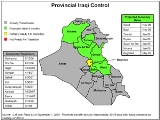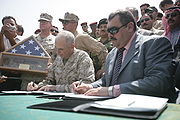
Provincial Iraqi Control
Encyclopedia
The objective of the Iraqi Government and Multi-National Forces in Iraq
is to achieve the transition of responsibility for each of the 18 provinces in Iraq from the Coalition to the Iraqi civil authorities, both national and local. Most attention on the issue is understandably focused on progress towards security within the provinces, both in terms of the threat from insurgents and the capability of the Iraqi Security Forces
, but other factors, such as the competence and capacity of local governance is also important.
Provinces are subject to regular assessment by the Iraqi government and the Coalition; when a province appears to be ready, a recommendation is made to the Iraqi Ministerial Committee for National Security, with the Prime Minister
making the final decision.
, Sulaymaniyah, Karbala, Basra, Al-Qadisiyah, Al-Anbar, Babil and Wasit
.
Muthanna was the first, on 13 July 2006, when Australian, Japanese and British forces from Multi-National Division-South East
transferred responsibility to the Governor and local authorities. With a small and homogeneous Shia population, there had been very little militia violence and few attacks on Coalition forces in the preceding months, encouraging good progress in developing the capacity of the Iraqi armed forces and Ministry of the Interior forces there. Equally, the Governor of Muthanna enjoyed a good local mandate, having been re-elected in local elections in January 2005.
Dhi Qar, also within the area of responsibility of the British-led MND-SE and the responsibility of the Italian and Romanian brigade, was handed over on 21 September 2006.
. Australian troops in MND-SE remained available to provide security support to the Iraqis in both Muthanna and Dhi Qar, should they request it.
Najaf, which had been garrisoned by first Polish, then US forces, was handed over on 20 December 2006.
In April 2007, Maysan province became the fourth to transition to provincial Iraqi control.
On May 30, 2007, the three provinces making up the Kurdistan Regional Government
transitioned to provincial Iraqi control, bringing the total count to 7.
In October 2007, Karbala became the eighth province to transfer to provincial Iraqi control. The transfer of Basra in December 2007 marked the half-way point in transferring all provincial security over to Iraqi security forces.
In July 2008 the tenth province, Al-Qadisiyah, also transferred to Iraqi control.
 On September 1, 2008, in the wake of the decreasing levels of violence, the U.S. Army transferred control of the expansive Al-Anbar province over to Provincial Iraqi Control. A limited U.S. presence will be maintained to ensure security. Al-Anbar is the 11th province to be transferred to Iraqi security.
On September 1, 2008, in the wake of the decreasing levels of violence, the U.S. Army transferred control of the expansive Al-Anbar province over to Provincial Iraqi Control. A limited U.S. presence will be maintained to ensure security. Al-Anbar is the 11th province to be transferred to Iraqi security.
In October 2008, Babil province became the twelfth province to return to Iraqi control, whilst Wasit was transferred later in the month, making it the thirteenth province to be transferred.
into effect, transferring security responsibility to the GoI, even though not all of the provinces had completed the PIC transition process. At the request of the GoI, however, a new Joint Sub-Committee for Provincial Security was formed under the auspices of the SA to assess conditions in the remaining five Iraqi provinces that did not transition to PIC before January 1, 2009. This sub-committee met for the first time in January 2009.
Multinational force in Iraq
The Multi-National Force – Iraq was a military command, led by the United States, which was responsible for Operation Iraqi Freedom. Multi-National Force – Iraq replaced the previous force, Combined Joint Task Force 7, on 15 May 2004, and was later itself reorganized into its successor, United...
is to achieve the transition of responsibility for each of the 18 provinces in Iraq from the Coalition to the Iraqi civil authorities, both national and local. Most attention on the issue is understandably focused on progress towards security within the provinces, both in terms of the threat from insurgents and the capability of the Iraqi Security Forces
Iraqi Security Forces
The Iraqi Armed Forces are the military forces of the Government of Iraq. They consist of the Iraqi Army, the Iraqi Air Force, and the Iraqi Navy....
, but other factors, such as the competence and capacity of local governance is also important.
Provinces are subject to regular assessment by the Iraqi government and the Coalition; when a province appears to be ready, a recommendation is made to the Iraqi Ministerial Committee for National Security, with the Prime Minister
Prime Minister of Iraq
The Prime Minister of Iraq is Iraq's head of government. Prime Minister was originally an appointed office, subsidiary to the head of state, and the nominal leader of the Iraqi parliament. Under the newly adopted constitution the Prime Minister is to be the country's active executive authority...
making the final decision.
Provinces under Iraqi Control
As of October 2008, thirteen provinces had successfully completed transition to provincial Iraqi control: al Muthanna, Dhi Qar, Najaf, Maysan, Dahuk, ArbilArbil
Arbil / Hewlêr is the fourth largest city in Iraq after Baghdad, Basra and Mosul...
, Sulaymaniyah, Karbala, Basra, Al-Qadisiyah, Al-Anbar, Babil and Wasit
Wasit
Wasit is a place in Wasit Governorate, south east of Kut in eastern Iraq.-History:During Ottoman times, it was the head city of the sanjak of Wasit.To quote UNESCO:...
.
Muthanna was the first, on 13 July 2006, when Australian, Japanese and British forces from Multi-National Division-South East
Multinational Division Central-South
Multinational Division Central-South , created in September 2003, and supported by NATO, was a part of the Multinational Force Iraq. Headquartered in Camp Echo, it was under Polish command until October 2008, when the last of Poland's troops were withdrawn. Polish contingent was its largest...
transferred responsibility to the Governor and local authorities. With a small and homogeneous Shia population, there had been very little militia violence and few attacks on Coalition forces in the preceding months, encouraging good progress in developing the capacity of the Iraqi armed forces and Ministry of the Interior forces there. Equally, the Governor of Muthanna enjoyed a good local mandate, having been re-elected in local elections in January 2005.
Dhi Qar, also within the area of responsibility of the British-led MND-SE and the responsibility of the Italian and Romanian brigade, was handed over on 21 September 2006.
. Australian troops in MND-SE remained available to provide security support to the Iraqis in both Muthanna and Dhi Qar, should they request it.
Najaf, which had been garrisoned by first Polish, then US forces, was handed over on 20 December 2006.
In April 2007, Maysan province became the fourth to transition to provincial Iraqi control.
On May 30, 2007, the three provinces making up the Kurdistan Regional Government
Kurdistan Regional Government
The Kurdistan Regional Government , , is the official ruling body of the predominantly Kurds-populated Kurdistan Region in Northern Iraq...
transitioned to provincial Iraqi control, bringing the total count to 7.
In October 2007, Karbala became the eighth province to transfer to provincial Iraqi control. The transfer of Basra in December 2007 marked the half-way point in transferring all provincial security over to Iraqi security forces.
In July 2008 the tenth province, Al-Qadisiyah, also transferred to Iraqi control.

In October 2008, Babil province became the twelfth province to return to Iraqi control, whilst Wasit was transferred later in the month, making it the thirteenth province to be transferred.
Transition after Security Agreement signed
As of December 31, 2008, 13 of Iraq’s 18 provinces had successfully transitioned to Provincial Iraqi Control (PIC). On January 1, 2009, the SA (see also U.S.–Iraq Status of Forces Agreement) between the U.S. and Iraq wentinto effect, transferring security responsibility to the GoI, even though not all of the provinces had completed the PIC transition process. At the request of the GoI, however, a new Joint Sub-Committee for Provincial Security was formed under the auspices of the SA to assess conditions in the remaining five Iraqi provinces that did not transition to PIC before January 1, 2009. This sub-committee met for the first time in January 2009.

